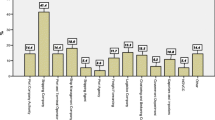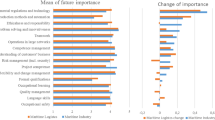Abstract
Numerous factors over the past three decades have contributed to a major decline in the number of seagoing staff in the United Kingdom. These include shipping companies opting for other flags, as well as the profession itself becoming less and less attractive for school leavers. This decrease in numbers is not only significant for shipping companies, but also for the allied services which used to get supported from seafarers coming ashore in search of a new career. It is now recognised that changes in the maritime skills base will affect both the seagoing as well as the shore side of the industry.
This paper examines the decline in number of the UK Merchant Navy officers and cadet from glory of the past. Also the idea of a massive shore industry habitually employing former officers: therefore these can be seen as a core resource in the maritime labour market.
Similar content being viewed by others
References
Pugh, D., Skinner, L.:An analysis of marine related activities in the UK economy and supporting science and technology. Southampton: IACMST (Office of Science and Technology), 1996.
Ibid.
Moreby, D.H. and Springett, P.:The UK shipping industry: Critical levels study. London: British Marine Charitable Foundation, 1990.
BIMCO:The world-wide demand for and supply of seafarers. Warwick: University of Warwick, 1990.
Tecnecon:Tecnecon Project: EU maritime professions study. Brussels: European Commission, DG7, 1996.
McConville, J.:The employment potential of UK Seafarers: A monologue. London: The Marine Society, 1995.
McConville, J. & Glen, D.:The employment implications of the United Kingdom’s merchant fleet’s decline. In:Marine Policy. Vol. 21 (1997), No. 2, pp. 267–276.
Chamber of Shipping:Britain’s maritime skills: an audit. London: Chamber of Shipping, 1997.
Gardner, B. M., Pettit, S.:A study of the UK Economy’s requirements for People with experience of working at sea. Cardiff: Cardiff University of Wales, 1996.
See also the proceedings of the European Harbour Masters’ Association conference EHMA (1994); the report on the research into skills by British Ports Industry Training, (1995); the unpublished report by the UK Harbour Masters’ Association (1995 and 1996).
Ibid. p. 37
Gardner, B.M., Pettit, S.J.:Seafarers and the land-based jobs market: the present UK situation. In:Marine Policy. Vol. 23 (1999), No. 1,pp. 103–115.
Gardner, B.M., Pettit, S.:The land-based jobs market for seafarers: consequences of market imbalance and policy implications. In:Marine Policy.Vol. 23 (1999), No. 2, pp. 161–175.
Obando-Rojas, B., Gardner, B., Naim, M.:A system dynamic analysis of officer manpower in the merchant marine. In:Maritime Policy and Management. Vol. 26 (1999), No. 1, pp. 39–60.
Op. Cit.7.
Gardner, B.M., Naim, M., Obando-Rojas, B., Pettit, S.:Maintaining the maritime skills base: does the Government have a realistic strategy? In: Maritime Policy and Management. Vol 28 (2001), No. 4, pp. 347–360.
Op. Cit. 7.
House of Commons:The future of maritime skills and employment in the UK. London: HMSO, 1993.
House of Commons Joint Working Party:British Shipping: Challenges and Opportunities. London: HMSO, 1990.
House of Commons:The future of the UK shipping industry. Report and proceedings of the Environment, transport and regional affairs committee. London: HMSO, 1999
DETR:British Shipping: Charting a new course. London: 1998. Available [on-line] http://www.shipping.dtlr.gov.uk/cnc/index.htm.
Ibid.
Op. Cit. 20
Op. Cit. 19.
SMarT: Seafarers’ Marine Training scheme — Government contribution towards costs of training ships’ officers, launched in 1998.
Op. Cit. 15.
See www.gotosea.org www.mntb.org.uk www.marine-society.org/careers (includes web ships) www.british-shipping.org/training www.shipping.detr.gov.uk/our-ships/index.htm
Palmer, N.:Education and Training: priorities for the future. In:The Second International Maritime Training and Education Seminar. London: Nautical Institute, 2001.
Sea Vision — [on-line] www.seavisionuk.org
Op. Cit. 28
METNET — Thematic Network on Maritime Education, Training and Mobility of Seafarers:Task 9.3 Issues related to the mobility of seafarers in the EU. Southampton: Southampton Institute, 2002.
Author information
Authors and Affiliations
Rights and permissions
About this article
Cite this article
Tarver, S., Pourzanjani, M. Measuring and sustaining the UK maritime skills base: A review. WMU J Marit Affairs 2, 5–15 (2003). https://doi.org/10.1007/BF03195030
Issue Date:
DOI: https://doi.org/10.1007/BF03195030




